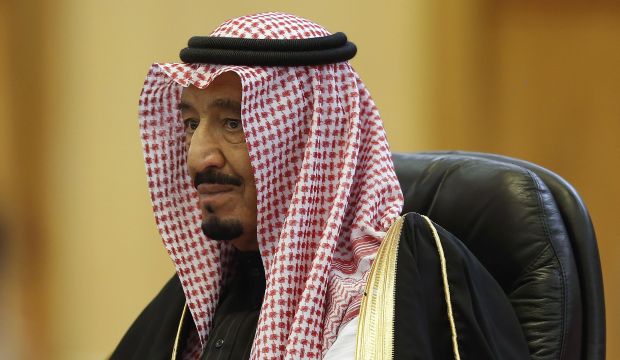
Saudi Arabia’s Crown Prince Salman Bin Abdulaziz Al Saud looks on during a meeting with China’s President Xi Jinping (not pictured) at the Great Hall of the People in Beijing March 13, 2014. (Reuters/Lintao Zhang)
Riyadh, Asharq Al-Awsat—In remarks at the start of his official state tour to China, Saudi Crown Prince Salman Bin Abdulaziz Al Saud highlighted the close bilateral ties between the two countries, confirming his desire to strengthen and develop these ties.
In a statement carried by the Saudi Press Agency on his arrival in Beijing, Crown Prince Salman said affirmed that relations between Saudi Arabia and China have witnessed a distinctive “quantum leap” following two historical visits paid by King Abdullah Bin Abdulaziz to China in 1998 and 2006, in addition to the visit by late Crown Prince Sultan Bin Abdulaziz in 2000.
“These visits have contributed to the enhancement of relations at various levels, emanating from the keenness of the leadership of the two countries to meet the aspirations of the two friendly peoples and strengthen the common interests of the two countries,” Crown Prince Salman said.
He emphasized that his visit comes within the framework of Saudi Arabia’s commitment to strengthening bilateral cooperation with China in all fields, in addition to greater consultation and cooperation on regional and international issues of common interest.
Crown Prince Salman is expected to hold high-level meetings with Chinese President Xi Jinping, Vice President Li Yuanchao, and other senior Chinese officials over the course of his visit.
He met with President Xi Jinping and other senior Chinese leaders during the welcome ceremony held at the Great Hall of the People in Beijing on Wednesday.
In comments to Asharq Al-Awsat, the head of the Chinese–Saudi Parliamentary Friendship Committee, Abdulaziz Al-Murshed, said: “Prince Salman’s visit to China comes within the framework of strengthening the bilateral relations between the two countries, particularly since China is considered one of the world’s major countries, politically and economically.”
“Saudi Arabia is seeking to strengthen its relationship with China in light of the political events taking place in the region and the fragmentation of the major countries over the situation in Syria,” he added.
Also speaking to Asharq Al-Awsat, Saudi Shura Council member Haya Al-Mani said that the visit represents a significant step in Saudi Arabia’s foreign policy of seeking to build balanced political and economic relations with other countries, particularly in terms of commercial exchange.
“Perhaps what confirms the significance of the economic ties between the two countries is that [commercial exchange] is expected to hit the 60 billion US dollar mark by the end next year,” she said.
Another member of the Saudi Shura Council, Saadoun Al-Saadoun, told Asharq Al-Awsat that several agreements are set to be sealed between Riyadh and Beijing during the visit, reflecting positively on “citizens, universities, research institutes, industry and commerce” in Saudi Arabia.
According to Saadoun, strengthening Saudi–Chinese bilateral relations will produce greater cohesion in terms of the political and economic vision on global issues.
Speaking to Asharq Al-Awsat, the Secretary-General of the King Abdullah International Center for Arabic Language Service, Dr. Abdullah Al-Washmi, highlighted the cultural ties between the two countries. He said: “Saudi–Chinese cultural ties are deep and old, particularly from an Islamic perspective.”
He affirmed that the cultural ties are the result of several factors, such as the approximately 1,300 Saudi students studying in China, the launching of the Arabic language program by the King Abdullah Center, in addition to King Abdullah’s decision to establish a branch of the King Abdulaziz Public Library in the Chinese capital, Beijing.
